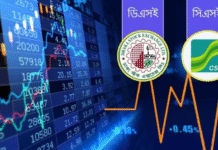
A containership is pictured at the loading terminal Altenwerder in the harbour of Hamburg in Germany on February 3.
The eurozone economy held steady in late 2015 despite the buffeting from global market turmoil and a sharp slowdown in China, official data showed Friday, but the outlook is clouded.
Analysts said the figures were ‘something of a relief’ after recent weakening data had suggested a modest recovery in the 19-nation single currency bloc was running out of steam.
At the same time, the report also pointed up the risks and the European Central Bank, which has launched an unprecedented one-trillion-euro stimulus programme, may have to do even more to get the economy back on track, they said.
The Eurostat statistics agency said the eurozone grew 0.3 per cent in the last three months of 2015, the same pace as in the previous quarter and in line with analyst forecasts.
For all 2015, it expanded 1.5 per cent, coming in short of the 1.6 per cent estimate given by the European Commission last week.
Among the major eurozone economies, Germany gained 0.3 per cent in the fourth quarter, unchanged from the third, while France slowed to 0.2 per cent from 0.3 per cent.
Italy also slowed, to just 0.1 per cent from 0.2 per cent as Spain led the pack with another gain of 0.8 per cent.
Bailed out Greece showed a distinct improvement from a negative 1.4 per cent to minus 0.6 per cent but Athens remains saddled with a huge mountain of debt and it is struggling to meet the tough terms laid down in a third debt rescue agreed with its international creditors last year.
Outside the eurozone, Britain rose to 0.5 per cent from 0.4 per cent.
For the full 28-nation European Union, the economy gained 0.3 per cent in the fourth quarter, down from 0.4 per cent in the third, and expanded 1.8 per cent for the year.
Howard Archer at IHS Global Insight said that while the 2015 growth rate of 1.5 per cent was the best since 2011, the fourth-quarter performance was only ‘lacklustre’ and the outlook was not promising.
‘We have been expecting eurozone growth to improve modestly to 1.7 per cent in 2016 but this is currently looking ever more questionable and may well need to be revised down,’ Archer said in a note.
‘There are clearly mounting downside risks to the eurozone growth outlook coming from global growth problems and financial market weakness and volatility,’ he said.
Other analysts were equally guarded.
‘The fact that eurozone growth did not slow in the fourth quarter provides little comfort in the current environment of global market turmoil and does not preclude
the need for further decisive policy action from
the ECB,’ Capital Economics said.
Capital Economics even warned that it may have to cut its already low 1.2-per cent growth forecast for this year.
‘We have pencilled in growth of 1.2 per cent in 2016 but the
recent turmoil in global financial markets and signs of renewed stress in peripheral eurozone (countries) have increased the downside risks even to our forecast,’ it said.
Source: New Age









